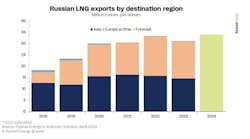The question of whether the US should remove restrictions on crude oil exports is so complex that it has moved beyond a simple “yes-no” issue, speakers agreed during a Sept. 23 discussion hosted by Washington law firm Arent Fox LLP.
“This clearly is a case where politics and policy intersect,” said retired US Sen. Byron L. Dorgan (D-ND), the discussion’s moderator who served on the Energy and Natural Resources Committee and now is an Arent Fox senior policy advisor.
“A lot of this will be discussed at town meetings,” Dorgan said, adding, “But this might not be a ‘yes-no’ choice. There could be gradations.”
Karen A. Harbert, president of the US Chamber of Commerce’s Institute for 21st Century Energy, meanwhile, said, “This is a very emotional issue—really, a pocketbook issue for the American public.” But the question also has begun to affect US relations with other countries, she added.
“Who would have thought that in the middle of trade negotiations with Europe, they would come to us and ask for an additional chapter on energy with a de-facto crude oil export policy?” Harbert asked. “The administration, not too surprisingly, is resisting this.”
The Obama administration probably is avoiding a decision on the matter because of fears that allowing more crude exports would raise US gasoline prices and harm Democratic candidates in November’s midterm elections, IHS Inc. Vice-Chairman Daniel Yergin said in his keynote address to the forum.
“If the prices went up, those who voted to remove the ban would feel uncomfortable,” he drily observed.
Otherwise stranded
Yergin said that a recent IHS study concluded that leaving existing crude export restrictions in place would slow down US production growth. He also conceded that Mid-Atlantic refineries enjoy a price advantage with an otherwise stranded resource because they are configured to process the lighter crude coming from onshore US tight oil formations.
“They’d still have an advantage,” Yergin said. “Maintaining that complex is important.”
But Graeme Burnett, senior vice-president for fuel optimization at Delta Air Lines Inc., which bought one of those refineries in 2012, said that lifting the crude export ban would be bad US policy.
In addition to raising global prices and hurting domestic refining margins, it also would delay rationalization of an about 1 million b/d Atlantic Basin processing capacity by encouraging otherwise uneconomic European plants to stay open, Burnett said. Allowing the export of any US crude with 40° API gravity or higher would begin to address ambiguities which have emerged recently, he said.
“If the ban is lifted, without any holistic view of other legislation including the Jones Act, a refiner in Europe will be able to buy US crude at Rotterdam cheaper than I can buy it in Philadelphia,” he warned. “Their shipping cost from the US Gulf Coast would be closer to $2/bbl, whereas ours would be $6/bbl on a Jones Act vessel.”
US light oil refiners might be inclined to support more US crude oil exports if their authorization was part of a legislative package which also included repeals of the Jones Act, which requires domestically produced goods to use US-flagged vessels when moving between US ports, and the federal Renewable Fuels Standard, under which refiners otherwise would have to buy more alternative fuel credits, Burnett said later.
A difficult package
“That would be difficult,” Harbert responded. “If you started with repealing the crude export ban and layer on removing the Jones Act and RFS, you’d have a behemoth no politician would want to touch.”
An audience member—Joanne M. Shore, chief industry analyst at the American Fuel & Petrochemical Manufacturers—suggested granting East Coast refiners multiyear Jones Act waivers might give them breathing room if US crude export restrictions were lifted. “We’re going to have to look at shorter-term opportunities to let us test the markets,” Harbert said.
Frank A. Verrastro, a senior vice-president who holds the James R. Schlesinger Chair for Energy and Geopolitics at the Center for Strategic & International Studies, suggested that the US will need to be flexible and adaptable for the next few years because its crude oil production outlook has changed so dramatically.
But another panelist—Daniel A. Weiss, the senior vice-president for campaigns at the League of Conservation Voters—said the US still depends heavily on crude imports because it consumers 25% more than it producers. “Right now, we’re exporting about 1.5 million b/d of distillate and gasoline—except the jobs have stayed here,” he indicated.
Yergin said more US crude exports wouldn’t change the global equation dramatically, but simply send a message to Europe and other consuming nations that the US is in the game and should be taken seriously.
“But if we saw the discount increase and production investment go down, that could be the bell that would cause this export ban to finally be repealed,” Yergin said.
Contact Nick Snow at [email protected].

